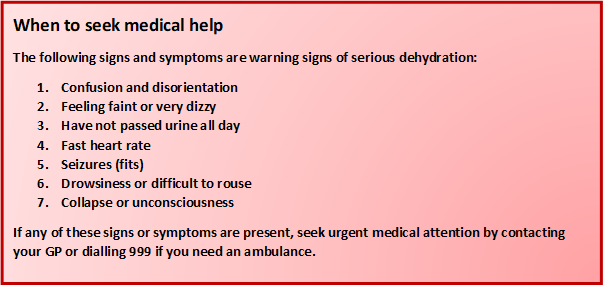Heat Health Advice for Older Adults
As we get older (over 65 years) we can become more at risk of heat-related illnesses. This risk is higher if we live alone, are bed-bound, have certain health conditions or take some types of medicines.
Our body changes as we age. The signs that we are becoming too hot, or dehydrated (low on fluid), can be harder to spot sometimes. Some medicines might make this worse. As our body gets older, the way we sweat can change. This can mean we don’t cool down as quickly or effectively as we did before. Your GP or pharmacist will be able to advise you if any of your medicines might make you more likely to become ill from the heat.
If you are over 65, or if you care for an older person, the following tips might help:
1. Try and stay cool
Putting a damp cloth around your neck can help, or putting your feet in a bowl of cool water. Make sure you turn off the heating, and turn off any lights or electrical appliances that you are not using.
2. Keep the heat out
-
Pull curtains or blinds to cover windows exposed to direct sunlight
-
Open windows at evening/night time when the air is cooler, and where it is safe, secure and feasible to do so
-
Increase airflow through the building where possible
-
Turn on air conditioning, if available. Make sure it is using a fresh air supply, which is important to prevent spread of infections
-
Electric fans need to be used with caution. If being used for higher temperatures, make sure you are adequately hydrated as they can increase the speed at which you sweat. Fans have no benefit at temperatures >35˚C.
3. Drink plenty of water during the whole day
It is crucial to stay well hydrated in the heat. Bring water with you wherever you go, and sip even if you don’t feel very thirsty. Drink enough so that your urine is a pale clear colour. If your doctor has told you not to drink too much water because of a health condition, such as heart disease, get advice from them about how to stay hydrated during the heat.
4. Eat small, cool meals
We often feel less hungry in hotter weather, but it is important to eat. Cool meals like salads and sandwiches can help you keep your energy up, without making your body or your kitchen too hot.
5. Stay connected
Write down the phone numbers of two or three relatives or friends, and ask them to check in on you. They might also be able to help you with everything you need to stay healthy during a heatwave, like bringing you your shopping, water or meals.
If you know an older person who lives on their own, try and connect with them to make sure they have everything they need.
6. Do the shopping in the cooler part of the day
Try to get your shopping and other chores done in the early, cooler parts of the day. Check if a friend or relative can help by doing the shop for you. The heat is strongest between 11am and 3pm, so try to avoid being outside during those times. If you do need to be outside, try to stay in the shade and take frequent breaks in shaded or air-conditioned areas.
7. Dress for the weather
Wear light and light-coloured clothing that is loose fitting. This should be more comfortable and will help you stay cool.
8. If you feel unwell, get urgent medical help
Never be afraid to ask for medical help if you feel unwell. The box below highlights some of the signs and symptoms to watch out for, but make sure to call for help if you feel at all unwell.

Created: 8 September 2023


